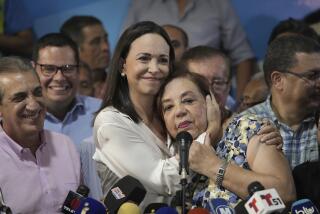Party Chief Abandons Anti-Sandinista Coalition
- Share via
MANAGUA, Nicaragua — The main anti-Sandinista coalition suffered a troublesome defection Friday when one of its leading center-left politicians withdrew and registered a rival slate of candidates for Nicaragua’s National Assembly in next year’s elections.
Mauricio Diaz Davila said he left the 14-party Nicaraguan Opposition Union because it cheated his Popular Social Christian Party out of a rightful share of the assembly candidates on a unified slate. He said the alliance, known as UNO, has “no possibility” of ousting the Sandinistas in the Feb. 25 vote.
The departure was the first by a party leader since UNO was formed in June and came three weeks after a bitter struggle for UNO’s presidential nomination nearly ended in a right-wing revolt.
Spokesmen for UNO, though surprised by Diaz’s action, said they did not think it would seriously weaken their candidate, Violeta Barrios de Chamorro, the newspaper publisher who is challenging President Daniel Ortega’s bid for reelection. They said Diaz acted to save his own assembly seat, without full support from his party.
But his defection was clearly a propaganda coup for the ruling Sandinista National Liberation Front, which is trying to deflate UNO’s image as a broad coalition and inflate those of splinter parties in a strategy of divide and conquer. The image of unity is crucial to UNO strategists, not only to attract outside financing but also to appeal to the 40% of the electorate thought to be uncommitted.
Diaz announced his decision late Thursday and assembled a joint slate of candidates Friday with his new ally, Erick Ramirez, presidential candidate of the Social Christian Party. The Sandinista newspaper Barricada carried the news under a front-page headline and said it reflected “a dose of realism in the face of UNO’s anticipated failure.”
Seven opposition parties outside UNO crowded the field of candidates before Friday’s filing deadline. Besides Ramirez’s Social Christians, there are three Marxist parties, one led by Moises Hassan, a prominent Sandinista defector; one faction each of the traditional Liberal and Conservative parties, and the Central American Unity Party of Blanca Rojas, the only woman besides Chamorro in the presidential race.
Diaz, 41, rose to prominence in Nicaraguan politics when opposition groups named him in 1987 to serve on a National Reconciliation Commission with government and church delegates. His party is well financed by Western European donors, supports a labor federation and publishes an influential weekly newspaper, La Cronica.
The party polled 5.2% of the vote in the 1984 elections, winning six of the opposition’s 35 seats in the Sandinista-controlled assembly.
Diaz said he quit UNO because it assigned his party only five of the coalition’s 90 candidacies for the next assembly. “We have a better chance running alone,” he said. “It’s more important to build for the 1996 election.”
His decision split the party. Its other leading assembly candidates, labor leader Antonio Jarquin and La Cronica editor Luis Humberto Guzman, remained on the UNO slate as independents.
A more serious problem, according to diplomats and politicians, is a lack of enthusiasm for the campaign by right-wing activists who had backed Enrique Bolanos, a leader of the Superior Council of Private Enterprise, for UNO’s presidential nomination.
Non-American diplomats said that the U.S. Embassy used the promise of campaign funding from Washington to keep four conservative parties from quitting UNO after Bolanos’ defeat. In negotiations that ended Thursday, the four parties were given the greatest share of UNO’s assembly slate--eight candidates each--a move that hurt Diaz’s party.
But the businessmen’s council remains aloof. Gilberto Cuadra, president of the council, said it has declined offers of top positions in the campaign organization and refused to work directly for the ticket unless UNO embraces more conservative policies.
More to Read
Sign up for Essential California
The most important California stories and recommendations in your inbox every morning.
You may occasionally receive promotional content from the Los Angeles Times.










